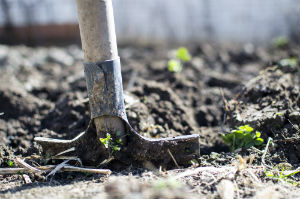Report outlines how climate change will affect gardeners
26 April 2017

The ‘perfect’ English garden could become a thing of the past thanks to climate change, scientists at the University of Reading have warned as a new report is published.
The far-ranging Gardening in a Changing Climate report, written in part by scientists at the University of Reading, looks at both the current impact of climate change and the future of gardening in the UK.
The report, the first in-depth analysis of the effects of climate change on gardening for more than a decade, was led by the Royal Horticultural Society (RHS) and supported by Reading scientists, among others.
Key findings
- The end of parks and village greens as we know them? Hotter, dryer summers, particularly in south of England, will turn areas of green grass into dusty, brown meadows
- Drought and flooding caused by more extreme weather will prevent many people growing their favourite plants in their gardens
- Blackcurrants among traditional fruits that could disappear
- Gardeners will face threats from new pests and diseases, which will spread quicker in warm conditions
- Making simple changes to gardens can help remove greenhouse gases from the atmosphere, but only 2% feel prepared to react
Implications for gardeners
The study warns that winter temperatures could increase by up to 5°C by 2080, and summer temperatures by up to 6.5°C. Increasing extreme weather would lead to more droughts and more flooding.
Although the growing season of some plant species will be extended, more mowing, weeding and pruning will be necessary. Heavier rainfall could also wash nutrients out the soil, meaning the timing of fertilisation will be crucial.
Pests and diseases will spread more easily in warmer conditions, with new invasive species becoming established.
A survey of more than 1,000 people was analysed in one chapter of the report co-authored by Dr Alastair Culham, Associate Professor of Ecology and Evolutionary Biology at the University of Reading. It showed that while most gardeners believe climate change is happening, only 2% feel prepared to deal with the impact.
What can gardeners do?
Gardeners, says the report, can reduce their carbon footprint by using water butts, avoiding petrol tools, chemicals and composts that contain peat. They can also actively remove carbon dioxide from the atmosphere by planting trees and plants and choosing a diverse range of plants to help boost the positive actions of pollinators.
One option for gardeners as conditions become less favourable for grass is to have grass-free lawns. Previous research carried out at the University of Reading has shown these can produce up to 90% more flowers and boost the population of insects and pollinators, as well as requiring less mowing and no chemical treatment.
Professor Paul Hadley, Professor of Horticulture at the University of Reading and who wrote the previous RHS report Gardening in a Global Greenhouse in 2002, said:
“This report provides timely and valuable guidance on the changes that we are all seeing in our gardens and the wider landscape.
“It is clear that there is a desire among members of the gardening community to understand the prospects for climate change in their gardens and the actions they can take to continue to garden successfully. We are pleased that research at the University of Reading will be useful to millions of gardeners across the country.”
Professor Nigel Arnell, Professor of Climate System Science at the University of Reading, said:
“Our variable climate has long been a challenge to gardeners, and climate change over the next few years will make gardening more uncertain.
“We will probably also have to rethink our vision of the ‘perfect’ English garden. Gardeners will have to think more carefully about what will grow, and where. This report draws attention to the risks and opportunities provided by our changing climate, and shows how we can use increasingly reliable projections of future weather and climate to make informed decisions.”
Professor Ellie Highwood, climate scientist at the University of Reading and President of the Royal Meteorological Society, said:
“Gardening is perhaps the most hands-on way that many of us interact with nature. This report reminds us how climate change is altering the balance of nature, with evidence growing almost everywhere we look.
“Scientific understanding of the impacts of climate change is much more sophisticated than it was 10 or 15 years ago. We knew that global warming would lead to increased average temperatures, but we now know more about how the heat is building up and its effects. In the UK, it is likely that the most serious impacts will occur as a result of more extreme weather events, as our normal patterns of weather are disrupted.
“This report serves as useful reminder that climate change is not just someone else’s problem. It affects us all, and can be affected by us all, gardeners included.
"The changes that we notice in our gardens are actually a really important part of recording the impact of climate changes. By keeping an eye on our plants, we can keep an eye on our planet."
